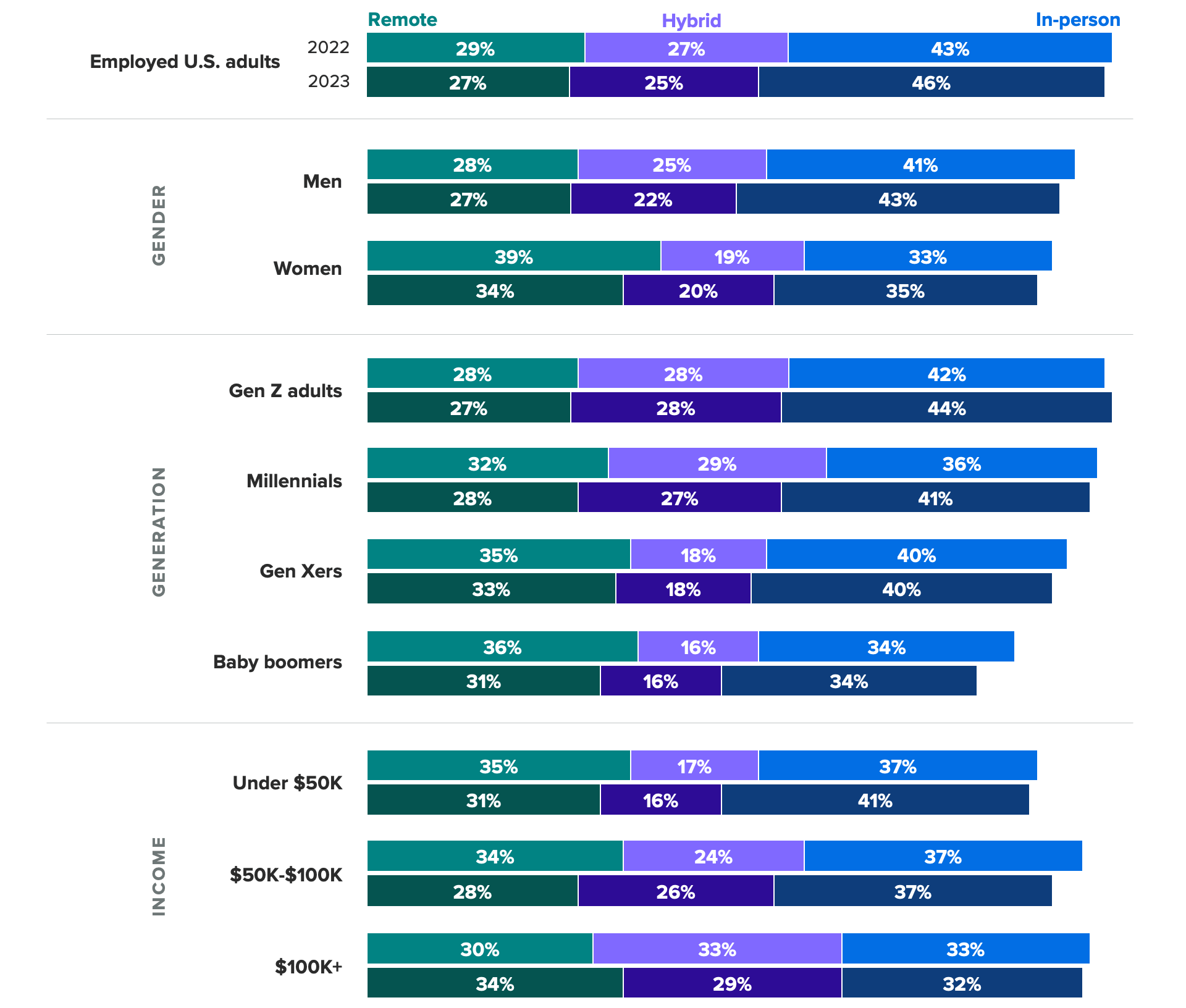Americans Are Starting to Lose Interest in Remote Work
Americans’ work priorities continue to shift more than three years into the COVID-19 pandemic. Workers now face high inflation and a barrage of negative headlines around the economy, while employers struggle to strike a balance between in-office and remote work. Download Morning Consult’s 2023 State of Workers report here.
If 2021 brought the Great Resignation and 2022 ushered in the Great Reshuffle, then 2023 is shaping up to bring something of its own: The Great Return.
Since January, dozens of major companies have implemented partial or full return-to-office mandates, including Amazon.com Inc., Starbucks Corp. and the Walt Disney Co. Layoffs, organizational restructurings and other cost-cutting efforts accompanied many of these orders, while executives have preached efficiency as the key to navigating an uncertain economic climate.
Workers are likely more amenable to those mandates than they were a year ago, according to data from Morning Consult’s recent State of Workers 2023 report.
Twenty-seven percent of employed U.S. adults said they prefer to do most of their work in a fully remote setting, per the January survey, down 2 percentage points from a survey conducted a year earlier in January 2022. Slight year-over-year decreases in remote work preference were seen among nearly all gender, age and household income bands, as outlined in the report.
A hybrid approach to work is also losing some popularity: A quarter of employed adults identified it as their preferred working method, another 2-point decline from last year. Meanwhile, sentiment toward in-person work is trending up. A plurality of employed adults (46%) said they prefer to work in-person, a 3-point increase over the same period.
Close to Half of Employed U.S. Adults Now Prefer to Work In-Person

Women, baby boomers and middle-income earners drive declines in remote work preference
- Shares of women and baby boomers who said they prefer to work remotely each dropped 5 points between 2022 and 2023. The decline was steeper (6 points) among those whose annual household income is between $50,000 and $100,000.
- Among respondents with a household income of less than $50,000 per year, preferences for remote and in-person work fell by 4 points and rose by 4 points, respectively, during the period.
- High-income earners (those with an annual household income of $100,000 per year or more) were the only major demographic group to express a higher interest in remote work year over year: 34% said it was their preferred style of working in 2023, compared with 30% in 2022.
- While online discourse may say otherwise, the data shows young people don’t mind going into the office: In-person work is now preferred by pluralities of both millennials and Gen Z adults — with the former reporting a 5-point increase since last year.
- Gen Xers saw the least amount of year-over-year movement. Equal shares of the cohort said they prefer hybrid and in-person work in 2023 as they did in 2022, while the share who stated a preference for remote work ticked down by 2 points.
Remote control
Despite broad declines in preferences for remote work, more than half of employed U.S. adults still favor it in some capacity, whether full time or hybrid.
The top-cited reasons for those who don’t prefer in-person work were hesitations over commutes, an unideal work-life balance and feeling less comfortable working in an office compared with remote, per the survey.
After more than three years of widespread remote work adoption, it’s unlikely that the employed American population will ever fully disregard the benefits of working from home. As such, work location policies will remain a point of contention that could ebb and flow alongside the ever-changing state of employer-employee power dynamics and the broader economy.
The Jan. 21-29, 2023, survey was conducted among a representative sample of 6,610 U.S. adults, with an unweighted margin of error of plus or minus 1 percentage point.
Ellyn Briggs is a brands analyst on the Industry Intelligence team, where she conducts research, authors analyst notes and advises brand and marketing leaders on how to apply insights to make better business decisions. Prior to joining Morning Consult, Ellyn worked as a market researcher and brand strategist in both agency and in-house settings. She graduated from American University with a bachelor’s degree in finance. For speaking opportunities and booking requests, please email [email protected].